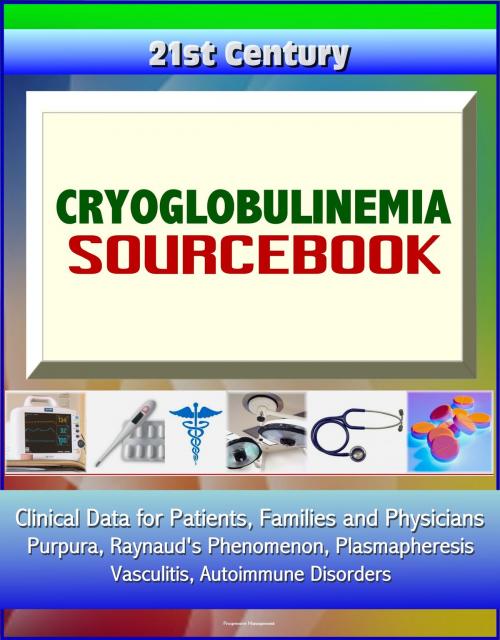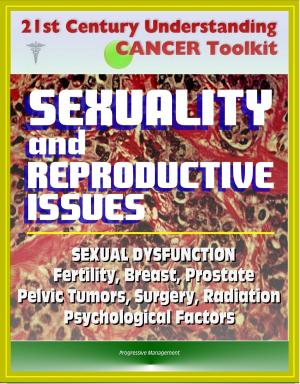21st Century Cryoglobulinemia Sourcebook: Clinical Data for Patients, Families, and Physicians - Purpura, Raynaud's Phenomenon, Plasmapheresis, Vasculitis, Autoimmune Disorders
Nonfiction, Health & Well Being, Health, Ailments & Diseases, Immune System| Author: | Progressive Management | ISBN: | 9781301786527 |
| Publisher: | Progressive Management | Publication: | September 25, 2013 |
| Imprint: | Smashwords Edition | Language: | English |
| Author: | Progressive Management |
| ISBN: | 9781301786527 |
| Publisher: | Progressive Management |
| Publication: | September 25, 2013 |
| Imprint: | Smashwords Edition |
| Language: | English |
This comprehensive ebook provides authoritative information and practical advice from the nation's health experts about cryoglobulinemia and related autoimmune disorders, vasculitis, and hepatitis C. Starting with the basics, and advancing to detailed patient-oriented and physician-quality information, the 21st Century Sourcebook series gives empowered patients, families, caregivers, nurses, and physicians the information they need to understand this autoimmune disorder.
Subjects and topics covered include symptoms, outlook, causes, who is at risk, diagnosis, tests and procedures, treatment, research, clinical trials, and more.
This edition includes our exclusive Guide to Leading Medical Websites with updated links to 81 of the best sites for medical information, which let you quickly check for updates from the government and the best commercial portals, news sites, reference/textbook/non-commercial portals, and health organizations.
Contents include: Part 1: Cryoglobulinemia * Part 2: Raynaud’s Phenomenon * Part 3: Hepatitis C (HCV) Basics * Part 4: Vasculitis * Part 5: NIH Autoimmune Disease Research * Glossary of Clinical Trials Terms * Section B: Guide To Leading Medical Websites - Internet Resources for Medical and Health Information
Essential mixed cryoglobulinemia can occur alone or with a systemic vasculitis. A systemic vasculitis is one that affects the body in a general or overall way.
“Cryoglobulinemia” refers to abnormal proteins in the blood. These proteins form a gel when a blood sample is exposed to temperatures lower than normal body temperature. Symptoms often include joint aches; weakness; nerve changes, such as numbness, tingling, and pain in the limbs; kidney inflammation; and a raised, bumpy, reddish-purple skin rash known as palpable purpura. Although essential mixed cryoglobulinemia can occur with other conditions, most often it is linked to chronic hepatitis C infection.
This comprehensive ebook provides authoritative information and practical advice from the nation's health experts about cryoglobulinemia and related autoimmune disorders, vasculitis, and hepatitis C. Starting with the basics, and advancing to detailed patient-oriented and physician-quality information, the 21st Century Sourcebook series gives empowered patients, families, caregivers, nurses, and physicians the information they need to understand this autoimmune disorder.
Subjects and topics covered include symptoms, outlook, causes, who is at risk, diagnosis, tests and procedures, treatment, research, clinical trials, and more.
This edition includes our exclusive Guide to Leading Medical Websites with updated links to 81 of the best sites for medical information, which let you quickly check for updates from the government and the best commercial portals, news sites, reference/textbook/non-commercial portals, and health organizations.
Contents include: Part 1: Cryoglobulinemia * Part 2: Raynaud’s Phenomenon * Part 3: Hepatitis C (HCV) Basics * Part 4: Vasculitis * Part 5: NIH Autoimmune Disease Research * Glossary of Clinical Trials Terms * Section B: Guide To Leading Medical Websites - Internet Resources for Medical and Health Information
Essential mixed cryoglobulinemia can occur alone or with a systemic vasculitis. A systemic vasculitis is one that affects the body in a general or overall way.
“Cryoglobulinemia” refers to abnormal proteins in the blood. These proteins form a gel when a blood sample is exposed to temperatures lower than normal body temperature. Symptoms often include joint aches; weakness; nerve changes, such as numbness, tingling, and pain in the limbs; kidney inflammation; and a raised, bumpy, reddish-purple skin rash known as palpable purpura. Although essential mixed cryoglobulinemia can occur with other conditions, most often it is linked to chronic hepatitis C infection.















